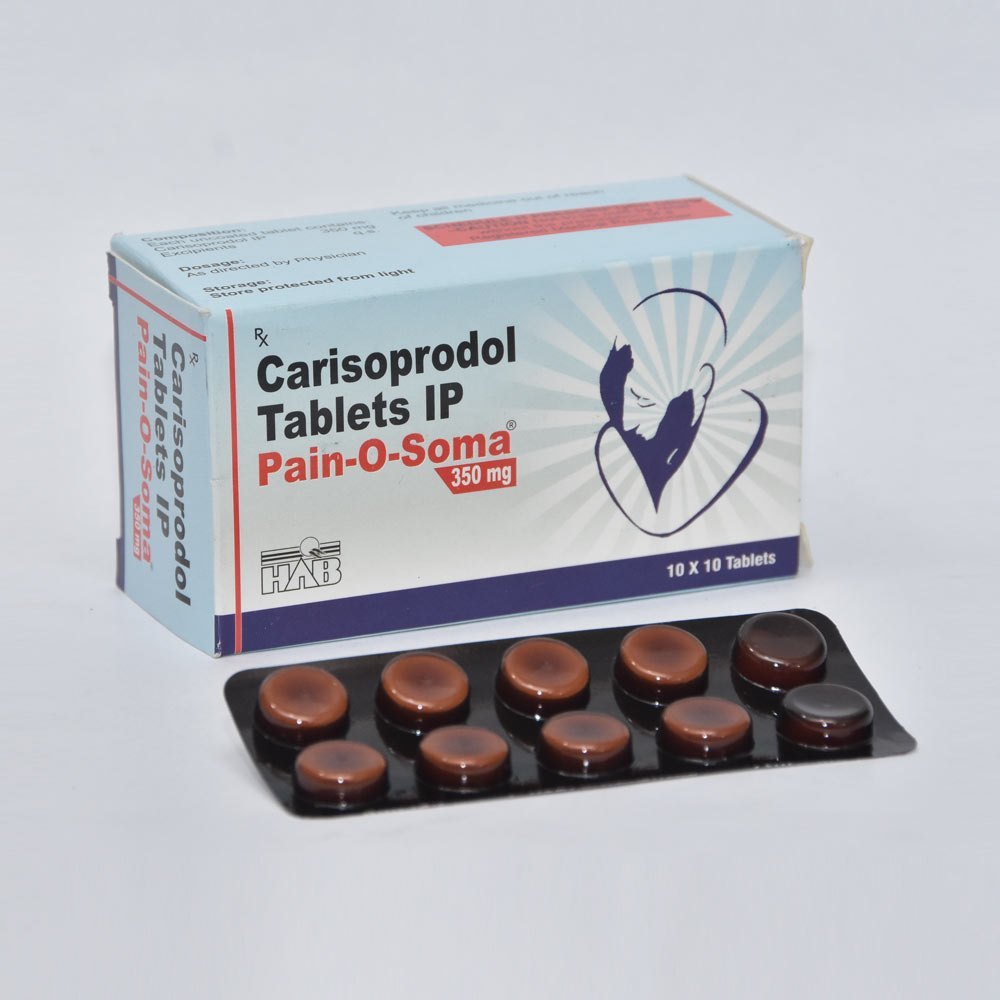Carisoprodol, commonly known by its brand name Soma, is a muscle relaxant used to relieve muscle pain and discomfort. It is often prescribed as part of a comprehensive treatment plan that includes rest, physical therapy, and other treatments. Here’s a detailed overview of its uses, side effects, and other important information:
Uses
- Muscle Pain and Discomfort: Carisoprodol is primarily used to relieve acute muscle pain and discomfort. It is typically prescribed for short-term use, usually in conjunction with other treatments like physical therapy or rest.
- Muscle Spasms: It can help alleviate muscle spasms associated with various musculoskeletal conditions.
How It Works
Carisoprodol works as a central nervous system (CNS) depressant, affecting the communication between the nerves and muscles. It is believed to work by interfering with the neuronal communication in the spinal cord and brain, leading to muscle relaxation.
Dosage and Administration
- Forms: Carisoprodol is available in tablet form.
- Dosage: The typical dose is 250 mg to 350 mg taken three times daily and at bedtime. Dosage may be adjusted based on individual needs and response.
- Administration: Carisoprodol is taken orally, with or without food. It should be used exactly as prescribed by a healthcare provider.
Side Effects
Common side effects may include:
- Drowsiness: This is a frequent side effect and can affect daily activities.
- Dizziness and Lightheadedness: Can impair coordination and balance.
- Headache: Some users may experience headaches while on the medication.
- Nausea: Gastrointestinal discomfort may occur.
Serious side effects can include:
- Allergic Reactions: Rare but serious reactions may include rash, itching, swelling, severe dizziness, or difficulty breathing.
- Dependence and Withdrawal: Long-term use can lead to physical dependence and withdrawal symptoms if the medication is abruptly discontinued.
- Seizures: Rarely, carisoprodol can cause seizures, especially in individuals with a history of seizure disorders.
Warnings and Precautions
- Drug Interactions: Carisoprodol can interact with other CNS depressants, including alcohol, benzodiazepines, and opioids, increasing the risk of severe side effects such as respiratory depression and sedation. Inform your healthcare provider of all medications you are taking.
- Medical Conditions: Use with caution in individuals with a history of drug or alcohol abuse, liver or kidney disease, or seizure disorders.
- Pregnancy and Breastfeeding: Carisoprodol should be used during pregnancy only if clearly needed. It can pass into breast milk, so breastfeeding mothers should consult with their healthcare provider before use.
Considerations
- Tolerance and Dependence: Carisoprodol has the potential for abuse, dependence, and addiction. It is generally recommended for short-term use, and its use should be monitored by a healthcare provider.
- Safe Storage: Store carisoprodol securely to prevent misuse or accidental ingestion, especially by children or others for whom it was not prescribed.
Safe Use
- Follow Prescriptions: Use carisoprodol exactly as prescribed. Do not adjust the dose or frequency without consulting your healthcare provider.
- Avoid Alcohol and Other Depressants: Combining carisoprodol with alcohol or other CNS depressants can increase the risk of severe side effects and should generally be avoided.
Withdrawal
- Discontinuation: If carisoprodol needs to be discontinued, it should be done gradually under the supervision of a healthcare provider to minimize withdrawal symptoms.
If you experience severe side effects, signs of an allergic reaction, or symptoms of overdose (such as extreme drowsiness, difficulty breathing, or loss of consciousness), seek medical attention immediately. Regular follow-up with your healthcare provider is essential to monitor the medication’s effectiveness and manage any potential side effects.


Reviews
There are no reviews yet.